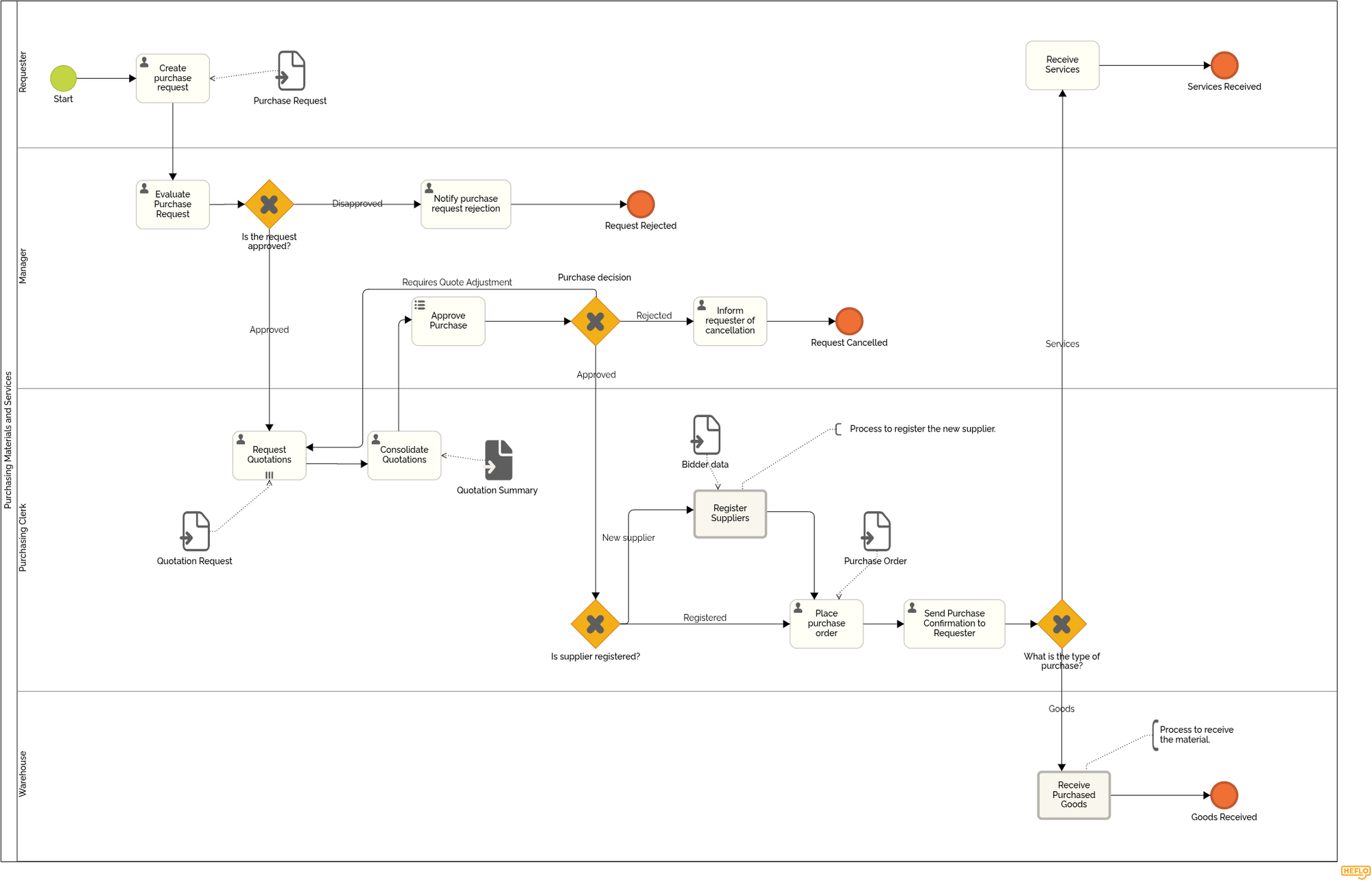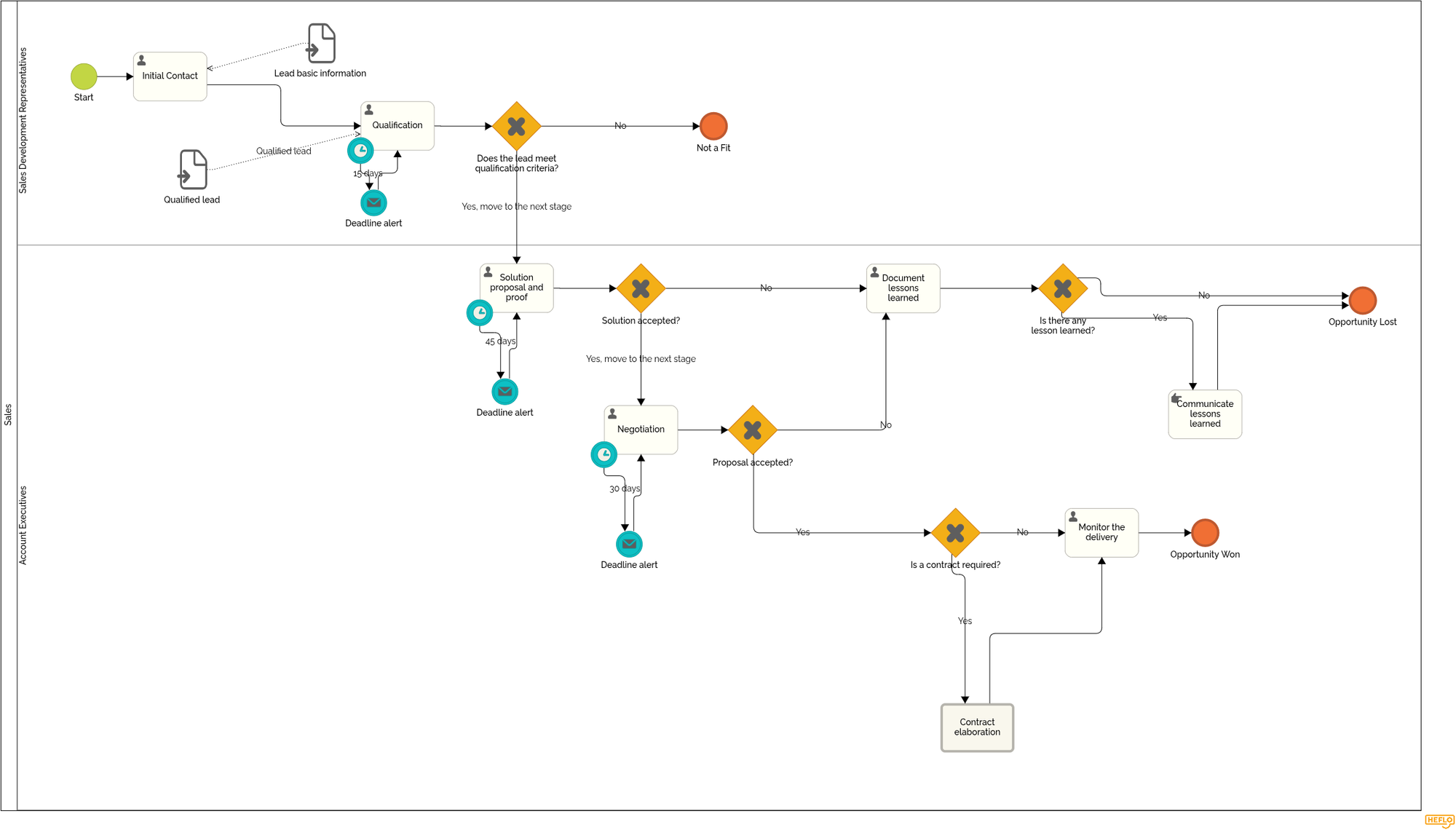5 Examples of Process Maps

Be honest: when was the last time you really understood how your company’s processes work?
If you had to explain — step by step — how your procurement, expense reimbursement, or sales processes flow, could you do it clearly?
Most people can't. That's where process mapping comes in.
Process maps aren't just fancy diagrams. They are powerful tools to make invisible workflows visible, align teams, spot inefficiencies, and even pave the way for automation.
In this article, you’ll explore 5 real-life examples of process maps that companies use to turn messy workflows into structured, efficient operations.
What is a Process Map?
A Process Map is a visual diagram that illustrates the sequence of activities, decisions, inputs, and outputs involved in completing a particular business process. Its primary goal is to provide a clear and structured overview of how work gets done — from start to finish.
Unlike textual documentation, process maps make it easy to understand:
- What tasks are performed
- Who is responsible for each step
- What decisions are made
- How information or materials flow through the process
Key Elements Typically Found in a Process Map:
- Start and End Points: Indicating where the process begins and ends
- Tasks/Activities: Represented by boxes showing each step or action
- Decisions: Usually shown as diamonds, representing branching points
- Arrows/Connectors: Indicating the flow and sequence of steps
- Swimlanes (optional): Used to separate responsibilities across teams or roles
By laying out these elements visually, process maps help organizations:
- Clarify roles and responsibilities
- Detect inefficiencies or redundancies
- Standardize procedures for training and compliance
- Facilitate automation and system integration
There are many types of process maps — such as flowcharts, swimlane diagrams, and value stream maps — each with its own use case. However, BPMN (Business Process Model and Notation) remains the most widely adopted and standardized notation for accurately modeling business processes, thanks to its clarity, flexibility, and suitability for both business and technical audiences.
🧭 Want to learn the complete step-by-step method for mapping processes? Check out our full article on Business Process Mapping available on our blog — a comprehensive guide to help you map, analyze, and optimize workflows effectively.
In the next section, we’ll explore 5 real-world examples of BPMN process maps commonly used across different organizations to illustrate how this notation can be applied effectively.
Example of process map #1 - Acquisition of Goods and Services
This process map presents a standardized, step-by-step workflow for the acquisition of goods and services within the organization. It captures the full procurement lifecycle—from the initial identification of a need by the Requester to the receipt of goods or completion of services, including possible scenarios such as rejection or cancellation. The process prioritizes transparency, adherence to internal procurement policies, proper supplier validation, and full traceability of all procurement-related activities.

Click the button below to open and edit this business process map with your free HEFLO Modeler account.
Also, you can also download a complete, professional documentation of this process map example using the link below. The document was generated by HEFLO after capturing all the tasks.
🛠️ Don’t just read. Build.
Seeing examples is great, but nothing beats creating your own process map.
👉 Start your first map with HEFLO – it’s free to try.
Example of process map #2 - Reimbursement of expenses
This process map shows how employees get reimbursed for legitimate company expenses accurately and efficiently. The employee initiates the process manually, their Manager and Accounts Payable review and approve the claim, and Accounts Payable issues payment and notifies the employee.

Click the button below to open and edit this map with your free HEFLO Modeler account.
Also, you can also download a complete, professional documentation of this business process map example using the link below. The document was generated by HEFLO after capturing all the tasks.
🚀 From map to automation:
You’ve seen how process mapping clarifies workflows. Now, imagine automating them.
👉 Learn how BPM tools transform mapped processes into real operational gains.
Example of process map #3 - ITIL Incident
This map outlines the ITIL Incident Management process, focused on its core objective: rapid restoration of IT services. It details the incident journey from reporting and logging to final resolution, closure, and feedback gathering. The workflow highlights key activities, decision points, and the responsibilities of roles like the Service Desk and 2nd Level Support, aiming for user satisfaction and continuous process improvement.

Click the button below to open and edit this map example with your free HEFLO Modeler account.
Also, you can also download a complete, professional documentation of this business process map example using the link below. The document was generated by HEFLO after capturing all the tasks.
Example of process map #4 - Hiring
This process map presents a comprehensive view of the human resource hiring workflow, underscoring the strategic imperative of effective talent acquisition. It delineates each phase, clarifies the duties of key participants such as the Requester and Human Resources, and mandates clarity, operational efficiency, and a favourable candidate experience throughout.

Click the button below to open and edit the hiring map example with your free HEFLO Modeler account.
Also, you can also download a complete, professional documentation of the hiring process map using the link below. The document was generated by HEFLO after capturing all the tasks.
Example of process map #5 - Sales
This map illustrates a structured sequence of steps designed to guide potential customers from their initial interest through to a successful deal closure. The process aims to help sales teams manage opportunities more effectively, strengthen customer relationships, improve forecast accuracy, ensure process consistency, and enhance alignment across sales, marketing, and delivery teams.

Click the button below to open and edit this example of business process map with your free HEFLO Modeler account.
Also, you can also download a complete, professional documentation of this process map example using the link below. The document was generated by HEFLO after capturing all the tasks.
Free Class - Learn Process Modeling with BPMN
Enhance your business process modeling skills with our complimentary BPMN class. Learn to develop clear, effective diagrams that contribute significant value to your organization. This session offers practical insights and application examples for individuals at all levels of expertise.
👉 Ready to start? You can create your free HEFLO account to diagram and document these workflows yourself.